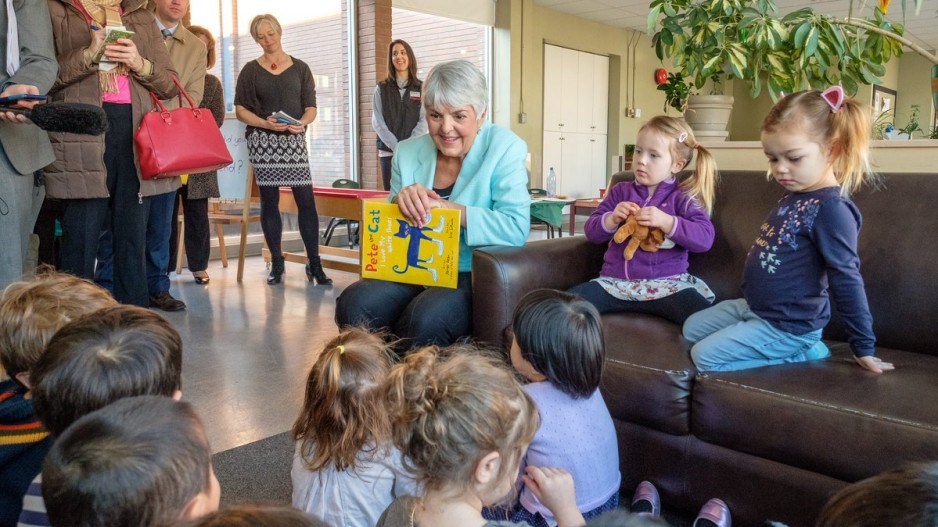The NDP government is slowly whittling down the $2 billion surplus it inherited from the previous Liberal government, and reallocating much of it to social spending, climate change initiatives and First Nations.
It is also being used to write off some of the massive debts incurred by ICBC and BC Hydro.
“To us, having a surplus simply for the sake of having a surplus, without having supports in place for people, doesn't make good sense,” B.C. Finance Minister Carole James said Tuesday, February 19, prior to her 2019 budget speech.
“Under the last government, health and education were underfunded and neglated,” James later said in her budget speech.“Fiscal mismanagement turned ICBC and BC Hydro into fiscal messes and money laundering and real estate speculation were allowed to take root in our province.”
The biggest beneficiaries of the NDP government's 2019 budget will be British Columbians with children, who will see the current child tax benefit they receive increase by $940 annually for a typical family with one child, but not until 2020.
Students will also see the cost of student loans go down, when interest in provincial student loans is eliminated.
Families that pay their own Medical Services Plan (MSP) premiums will also see a de facto tax reduction of $1,800 starting January 1, 2020, when MSP premiums are fully eliminated.
Combined, the new child benefit and elimination of MSP will save a family of four earning $60,000 a year $2,500. But those two benefits don't kick in until 2020.
A new $400 million “child opportunity benefit” will replace the previous early childhood tax credit, which only applied to children up to age six. The new benefit applies to children up to age 18, and will provide the average family with up to $1,600 per child, and $3,400 for three children. The new "child opportunity benefit" is not universal, however. A family with one child with an annual income exceeding $97,500 will not be eligible. Families with two children will be eligible if their income does not exceed $114,500.
For a typical family with one child, the new benefit is estimated to be worth $28,000. The difference between the new and previous child benefit for one child is a $940 annual increase.
Budget 2019 also eliminates interest on provincial student loans, which is estimated to save the average undergraduate with provincial loans $2,300.
The budget provides close to $1 billion in funding for its new CleanBC climate change and energy plan, and $3 billion in gaming revenue sharing with First Nations over 25 years.
On health care, the budget includes $1.3 billion in spending to improve health services and $550 million in additional funding for education.
It also includes $20 billion in capital spending, for hospitals, schools, transportation and power projects, including Site C dam.
Even with all the new spending, the government still expects to balance the budget and end the year with a $274 million surplus.
Despite the NDP's campaign promise of a $10 per day daycare program, there is little new in terms of child care funding. The government announced $1 billion for child care over three years in 2018 to create 22,000 new licensed child care space. Budget 2019 adds $27 million to child care.
Nor has a promised $400 renter's rebate promised by the NDP in the election campaign materialized in James' latest budget.
Building on the $7 billion over 10 years announced in budget 2018 for affordable housing, a new rent bank is being created with $10 million in funding. This will provide loans to those who are unable to pay their rent.
The previously announced funding for affordable housing promised 114,000 new affordable homes over 10 years. According to the budget documents, 17,000 have either been built or are under construction.
On the environmental side, budget 2019 earmarks $902 million to start implementing the CleanBC plan. It includes investments in transportation, $41 million for incentives for energy efficiency retrofits, $90 million for electric vehicle incentives, and carbon tax credits.
Some of the spending for CleanBC has not yet been finalized, however.
“Specifics are going to come,” James said. “Some programs are still being developed and finalized.”
While businesses will pay more for gasoline and heating in 2020, when the carbon tax increases from $35 to $40 per tonne, ordinary British Columbians will see an increase in carbon tax credits.
The carbon tax credit will increase by $223 million over the next three years. A family of four would get up to $400 in carbon tax credits.
The budget includes a plan to provide revenue sharing with First Nations worth $3 billion over 25 years, with the revenue coming from gaming. Of that, $300 million in revenue sharing has been earmarked for the next three years.
The budget provides $100 million for infrastructure in northern communities, including high-speed Internet. The funding appears to be targeted largely to the “LNG corridor” which is presumably from Dawson Creek to Kitimat.
On the capital side of the budget, the government is allocating $20 billion over three years for major capital works projects, including:
$17.5 billion for power generation and transmission;
$7.4 billion for hospitals;
$6.3 billion for major transportation projects;
$2.3 billion for school replacement.
The capital spending includes $1.9 billion for the new St. Paul's Hospital and $1.4 billion for the Pattullo Bridge replacement.
The capital spending for power generation and transmission includes$10.4 billion for Site C dam, $82 million for new transmission for the $40 billion LNG Canada project and $1.2 billion for the acquisition of the Waneta dam.
The three-year fiscal plan also earmarks $285 million for the new Peace River Electricity Supply (PRES). This project will extend transmission lines in northwest B.C. for the natural gas industry. That project is part of of the government's plans to reduce greenhouse gas emissions by allowing natural gas processing to use electricity rather than natural gas.




